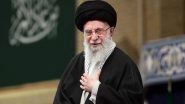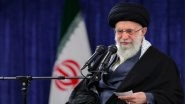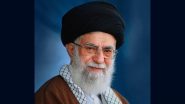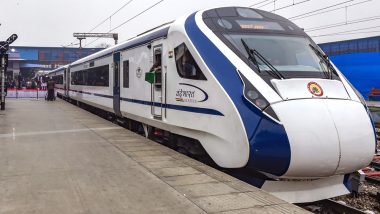New Delhi, September 29: The first commercial run of the Delhi-Katra Vande Bharat Express will be on October 5 and booking of tickets is now open on the IRCTC website, the railways said on Sunday. Home Minister Amit Shah will flag off the high-speed train on October 3 from Delhi. The train will bring down the travel time between Delhi and Katra, the last station on the way to Vaishno Devi temple, to eight hours from the current 12 hours. IRCTC Starts Ticket Booking of Delhi-Katra Vande Bharat Express, Amit Shah to Flag Off Inaugural Run on October 3.
Just like the previous version which runs between Delhi and Varanasi, the railways has not applied the dynamic fare principle on the new Vande Bharat train for Delhi-Katra. The minimum fare for travelling between New Delhi (NDLS) to Sri Mata Vaishno Devi Katra (SVDK) will be Rs 1,630 and the maximum will be Rs 3,015.
The train will run on all days of the week except Tuesdays. Train number 22439 New Delhi-Katra Vande Bharat Express will depart from the New Delhi railway station at 6 am to reach Katra at 2 pm. En route, the train will halt at Ambala Cantt, Ludhiana and Jammu Tawi for two minutes each. On the return journey the same day, train number 22440 Katra-New Delhi Vande Bharat Express will leave from the Katra railway station at 3 pm to reach the New Delhi railway station at 11 pm.
The luxury all air-conditioned chair car service with 16 coaches is an engine-less self-propelled trainset which allows for faster acceleration and deceleration, therefore reducing travel time by 40 per cent. The new train has a bigger pantry compared to the first Train 18 or Vande Bharat Express. Vande Bharat Beats Rajdhani, Gatiman and Shatabdi Express; Becomes First Train to Ply With 100 KMPH Average Speed Between Delhi-Allahabad.
It also has windows with a special provision to protect against stone-pelting and a cattle guard in the front to prevent damage to the train or derailment in case of cattle run. The first Vande Bharat Express was flagged off by Prime Minister Narendra Modi. The railways is expected to manufacture 40 more such trains by 2022, according to senior officials.












 Quickly
Quickly


